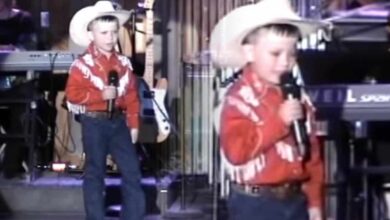Whenever Mom Played This Song After Dad Died, She Would Cry Until It Finished
“Seven Spanish Angels,” a poignant and evocative song, showcases the exceptional collaboration between Willie Nelson and Ray Charles. Released in 1984, this duet remains one of Nelson’s most cherished recordings, celebrated for its emotional depth and musical craftsmanship. The song narrates a gripping tale of two lovers who find themselves in a dire situation, ultimately meeting a tragic end as seven angels watch over them from above. The narrative unfolds against a backdrop of violence and loss, reflecting the complexity of the human experience.
The song’s haunting melody and rich, soulful lyrics are brought to life by the combined talents of Nelson and Charles. Willie Nelson’s distinctive voice, marked by its gravelly texture and sincere delivery, blends seamlessly with Ray Charles’ powerful and expressive vocals. Charles’ ability to infuse a song with deep emotional resonance complements Nelson’s storytelling, creating a compelling and memorable performance. Additionally, Nelson’s guitar work, characterized by his signature style, adds a layer of intimacy and authenticity to the track, enhancing its emotional impact.
Written by Troy Seals and Eddie Setser, “Seven Spanish Angels” quickly gained traction upon its release, becoming a major hit for Nelson. It achieved significant commercial success, topping the country charts for several weeks. This success not only reinforced Nelson’s status as a leading figure in country music but also underscored his ability to convey complex emotions through his music. The song’s popularity was further cemented by its ability to resonate with a broad audience, bridging the gap between country music enthusiasts and fans of Ray Charles’ genre-spanning work.
The impact of “Seven Spanish Angels” extends beyond its chart performance. The song has been covered by various artists over the years, including notable figures such as Trisha Yearwood, George Strait, and Miranda Lambert. These cover versions attest to the song’s enduring appeal and its capacity to inspire other musicians. Each artist brings their unique interpretation to the song, demonstrating its versatility and continued relevance in the music world.
Despite its acclaim, “Seven Spanish Angels” has also faced criticism for its portrayal of violence and its thematic elements. Some critics argue that the song’s depiction of gun violence and its representation of Latino culture could perpetuate negative stereotypes. This controversy highlights the ongoing debate about the role of art in reflecting and shaping societal views. While some interpret the song as a powerful exploration of themes such as love, loss, and redemption, others caution against its potential to glorify harmful behaviors.
The song’s controversial aspects do not diminish its artistic merit. Instead, they contribute to its complexity and the diverse interpretations it inspires. “Seven Spanish Angels” continues to be a subject of discussion among fans and critics alike, underscoring its significance in Willie Nelson’s discography and its place in the broader landscape of country music.
Willie Nelson, born on April 29, 1933, in Abbott, Texas, is a pioneering figure in country music. Known for his distinctive voice, innovative songwriting, and influential contributions to the genre, Nelson’s career spans several decades. His music often reflects his personal experiences and philosophical outlook, making him a beloved and respected artist. Nelson’s collaboration with Ray Charles on “Seven Spanish Angels” exemplifies his ability to create emotionally resonant music and connect with audiences on a profound level.
Ray Charles, born on September 23, 1930, in Albany, Georgia, was a groundbreaking artist whose career spanned multiple genres, including blues, jazz, and soul. His distinctive voice and innovative approach to music earned him a lasting legacy in the industry. Charles’ partnership with Willie Nelson on “Seven Spanish Angels” highlights his versatility and enduring influence as an artist. Together, Nelson and Charles crafted a song that continues to captivate listeners and stands as a testament to their remarkable musical talents.





